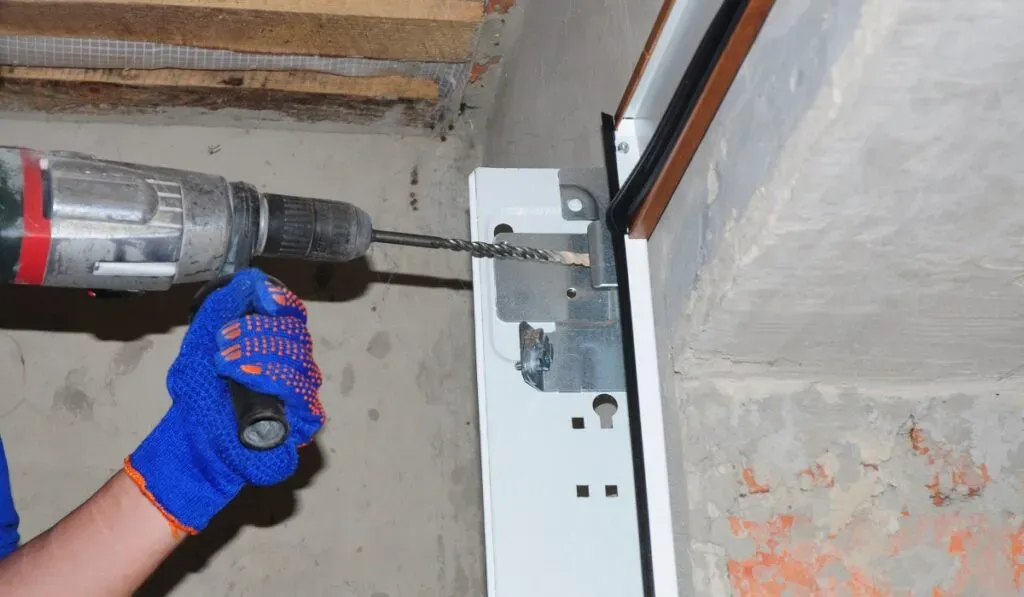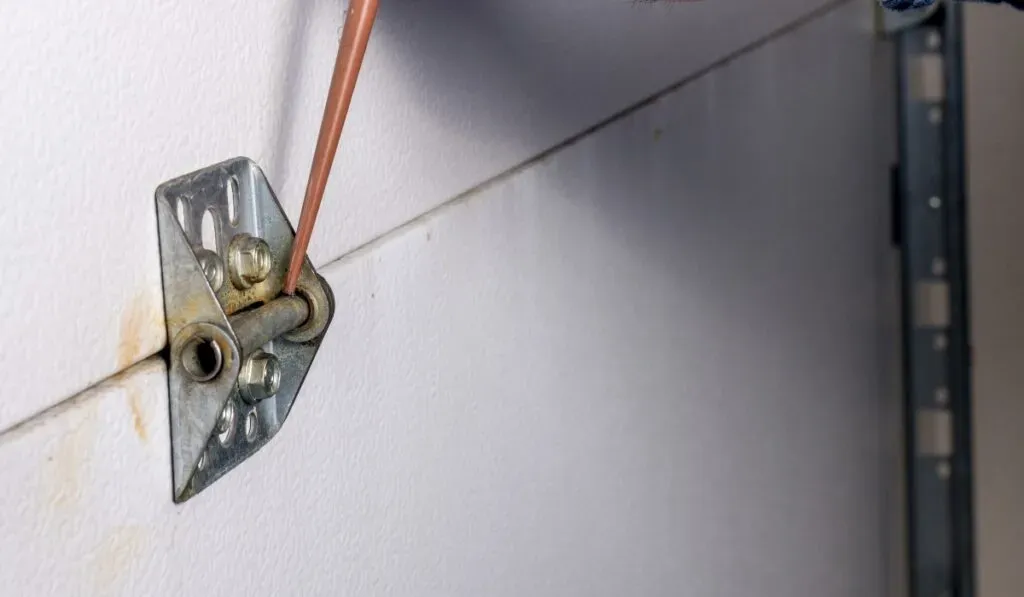
How to quiet a noisy garage door starts with identifying common causes and using simple fixes like lubricating moving parts or tightening hardware to stop creaks and rattles. Our guide helps homeowners learn to fix a noisy garage door and improve their quiet garage doors by addressing issues with noisy garage door openers and adding muffling tips for a quieter garage door opener.
Common Causes of Garage Door Noise
Garage doors make noises for lots of reasons. Knowing what causes the sounds helps you fix them faster. Check these out:
- Metal-on-Metal Contact Noise: Happens when parts rub without enough oil or grease.
- Mechanical Wear: Rollers and hinges get worn down after some use and make more noise.
- Broken Garage Door Springs: When a spring breaks, the door might bang loudly or drop suddenly.
- Misaligned Garage Door Tracks: Tracks that aren’t lined up right cause grinding sounds as the door moves.
- Worn Garage Door Cables: Old, frayed cables can rattle when the door opens or closes.
- Loose Mounting Brackets: If brackets are loose, they shake and make rattling noises.
- Garage Door Spring Tension Issues: Springs with wrong tension often cause strange sounds when moving.
Catching these problems early stops bigger damage later on.
Identifying the Source: Squeaks, Rattles, and Vibrations
Different noises tell you what’s wrong. Here’s how to spot them:
- Squeaking Sounds: Dry rollers or hinges need oiling or greasing fast.
- Grinding Noise: That grinding screech means rollers are worn and fighting against bad tracks.
- Rattling Like a Ghost Chain: Loose bolts or brackets shake while the door works.
- Humming Like an Off-Key Singer: The opener motor might be out of balance or under strain.
- High-Pitched Protests: Old springs making sharp squeals need adjusting or replacing soon.
- Nail-on-Chalkboard Noise: Metal parts rubbing together usually cause this scratchy sound—look for rusted bits needing oil.
- Dragging Sound: Something blocks the door’s smooth move—maybe debris or bent panels causing friction.
- Shrieking Noise & Banging Sounds: Loose bolts often cause these loud, scary noises; tightening them helps a lot.
Knowing what each noise means gets you closer to fixing it quick!
DIY Solutions to Quiet Your Garage Door
Lubrication: The First Line of Defense
Garage door lubrication helps cut down noise and keeps your door working right. When you lubricate moving parts, it stops friction that makes those annoying squeaks and grinding sounds.
There are two main garage door lubrication types you can use:
- Silicone-based lubricant works great on metal parts like rollers, hinges, and tracks. It pushes dust away and lasts longer without getting dirty.
- Lithium grease suits heavier parts like springs and bearings because it stays thick under pressure.
To lubricate metal components safely:
- Turn off power so the door doesn’t move by mistake.
- Clean old grease and dirt from all moving parts.
- Spread a thin layer of silicone-based lubricant on rollers, hinges, and tracks.
- Put lithium grease on the garage door springs for strong protection.
- Wipe off any extra lubricant so it doesn’t build up.
Lubricate every six months to make your garage door quieter and help it last longer.
Tightening Loose Hardware
Loose nuts or bolts make rattling sounds in your garage door system. You can fix this fast by tightening the hardware.
Here’s how to tighten garage door hardware:
- Look over all nuts, bolts, screws on rails, brackets, hinges, and roller mounts.
- Use a wrench or screwdriver to tighten loose nuts and bolts. Don’t crank too hard or you could strip the threads.
- Check hinge pins too; if they still wiggle after tightening, think about swapping them out.
Tightening hardware cuts down noise and keeps things safer by stopping parts from loosening while the door moves.
Aligning Garage Door Tracks
If your garage door tracks are misaligned, you’ll hear scraping or grinding noises when the door moves. Fixing track alignment makes the door slide smoother and quieter.
Check if both vertical tracks are parallel and have even space from the wall all along:
- If there are gaps between rollers and track edges or uneven spacing side-to-side, you need to adjust.
- Loosen mounting brackets just a bit with a socket wrench.
- Tap the track back into place using a rubber mallet carefully.
- Once tracks are straight with no bends, tighten the brackets up again.
Straight tracks stop rollers from rubbing weird spots. That cuts down harsh sounds and wear on parts.
Upgrading to Quieter Rollers
Swapping old metal rollers for nylon ones really helps reduce noise. Nylon rollers slide quietly because they soak up vibrations better than steel ones do.
Here’s why nylon rollers make sense:
- Nylon causes less friction noise when the door moves than metal rollers.
- They don’t need much lubrication since some models self-lubricate.
- Many nylon rollers come with sealed ball bearings that cut noise more and last longer.
When you need garage door roller replacement service, check that new rollers fit your current system size and type. After upgrading rollers, your door will sound way quieter right away.
By doing these simple fixes—lubricating well, tightening loose hardware carefully, lining up crooked tracks exactly right, and putting in softer nylon rollers—you can quiet your noisy garage door yourself without hassle or danger.
Garage Door Opener Noise Reduction
Isolating the Opener Motor
Noisy garage doors often start with the garage door opener motor shaking. These vibrations travel through the garage frame. They make annoying rattling and humming sounds. You can stop this by using motor vibration isolation mounts or rubber pads. These parts soak up the shakes.
Put these mounts under the opener to isolate the opener from ceiling beams or walls. This simple fix cuts down noise by adding garage door vibration damping. Rubber pads cost little and are easy to set up. Just slide them between the motor and where it’s mounted.
When you isolate the motor, vibrations don’t spread through your garage. This keeps things quieter without big repairs or costs.
Upgrading to a Belt-Drive Opener
If your garage door uses a chain-drive, think about switching to a belt-drive garage door opener. Chain drives click and clank because metal rubs on metal. They also need you to adjust them often.
Here’s how a garage door chain drive vs belt drive compares:
- Belt drives use rubber belts that run smooth and quiet.
- They take less work to keep up.
- Belt drives pass fewer vibrations through mounts.
Changing from a chain to belt means professional garage door opener installation and repair to swap your opener. This cost helps you get much less noise while it runs.
Soundproofing the Garage
Fixing parts is good, but stopping sound in your whole garage works better too. A soundproof garage uses stuff that blocks or soaks up noise near the door.
Try these ideas:
- Put in soundproofing insulation materials like foam panels or fiberglass batts inside walls.
- Wrap your opener in a noise blanket for opener to muffle sounds from its motor.
Soundproofing cuts noise leaks and helps save energy by sealing gaps where sound sneaks out.
Put together these tips—motor isolation, upgrading openers, and adding insulation—to quiet down your garage door well. If you don’t feel sure about electric parts or installing, ask a pro for help to stay safe and get good results.
Preventative Maintenance for a Quiet Garage Door

Regular Inspections and Cleaning
Keeping up with garage door maintenance helps your door work quietly and last longer. Use a garage door maintenance checklist. Check all moving parts and clean the sensors. Listen carefully to catch any odd sounds early.
Clean the garage door sensors often. Dirt or misalignment can make your door act funny or noisy. Use a soft cloth and mild cleaner—don’t use strong chemicals.
Try to get professional garage door maintenance with an inspection at least once a year. They can find problems like worn rollers or loose bolts that you might miss. Also, do seasonal inspections because weather changes can mess with your door’s performance.
Here’s a quick troubleshooting checklist you can follow:
- Tighten loose bolts or screws.
- Check rollers for damage or wear.
- Listen for grinding, squeaks, or rattles.
- Make sure sensors are clean and lined up right.
Doing these checks keeps your garage door quiet and working well for years.
Seasonal Adjustments and Weatherproofing
Seasonal garage door maintenance stops problems caused by weather changes. Hot or cold weather makes parts expand or shrink, which can cause noise.
One easy fix is putting on new garage door weather stripping. It blocks drafts, water, and dirt from getting inside. This also cuts down on rattling noises.
Adjust the spring tension as seasons change too. If the springs are too tight, they make loud sounds. If too loose, the door might slam shut suddenly.
Use weatherproofing insulation materials around the frame to stop vibrations from reaching your house. This also keeps your home warmer in winter and cooler in summer.
Doing seasonal care stops small issues before they get noisy or expensive to fix.
Balancing the Door and Checking Springs
A balanced garage door moves smooth without stressing parts. Test balance by pulling the emergency release and lifting the door halfway up by hand. If it stays put, it’s balanced right.
If it moves up or down quickly, it needs adjustment. Use proper tools and follow instructions carefully—springs hold a lot of tension and can be dangerous if you’re not sure what you’re doing.
There are two main spring types: torsion spring systems mounted above the door, and extension spring systems on the sides. Check both regularly for rust, gaps, or broken coils.
Broken springs should be replaced fast because they’re unsafe and make noise when opening or closing.
When to Call a Professional Garage Door Technician
Safety Considerations with Springs and Cables
Garage door springs and cables hold a lot of tension. Trying to fix broken garage door springs or mess with the garage door spring tension on your own can be dangerous. Both the torsion spring system and the extension spring system store strong energy that can cause serious injury if handled wrong.
Look out for worn or frayed cables, uneven coils on springs, or if your door feels hard to open. These are signs you should call a pro. A technician can do the right garage door spring adjustment safely.
Remember, safety is more important than saving a few bucks. Springs and cables need experts to handle them right. Plus, pros run an auto-reverse safety test. This test makes sure the door stops and reverses if it hits something—super important for preventing accidents.
Specialized Noise Assessments and Warranty Checks
Sometimes, strange noises mean bigger problems. If your garage door keeps grinding, banging, or vibrating weirdly even after some oiling, you should get a pro for a full garage door noise diagnosis.
Experts watch out for red flags like broken tracks, motor issues, or worn parts that could cause bigger trouble later on. Their inspections go deeper than what most people can safely check themselves.
Also, many garage doors come with warranties that cover repairs or upgrades. Pros know these rules well and make sure any work won’t void your warranty—helping you protect your investment while fixing noisy doors.
Upgrading to Quieter Garage Door Technology
Cutting down noise sometimes means upgrading parts instead of just fixing them:
- Swap old rollers for nylon ones to cut friction sounds.
- Change from a chain-drive opener to a belt-drive garage door opener for much less noise.
- Adjust chain drives right to stop rattling.
- Add motor vibration isolation mounts to reduce sound from the opener moving.
- Put a noise blanket on the opener to muffle operation sounds even more.
What Causes Garage Door Noise, and How Can I Identify the Source?
Garage door noise comes from different things. Finding the cause helps fix it fast and stops bigger problems.
- Garage door rattling happens when screws or bolts get loose. Then parts shake and hit each other.
- Squeaking noises show that metal parts like hinges or rollers rub without enough oil.
- A grinding noise means something inside the opener is worn or broken.
- Metal-on-metal contact noise happens when parts touch without grease or proper fit.
- Friction sounds appear if dirt piles up on tracks or rollers and makes movement hard.
To find where the noise comes from:
- Listen close to spots like hinges, springs, rollers, or opener motor.
- Check if noise happens only when door moves or all the time.
- Look for wear signs—rusty springs, cracked rollers, loose bolts, dry metal spots.
Knowing these clues helps fix noisy garage doors early and right.
What Type of Lubricant Should I Use, and How Often Should I Lubricate My Garage Door?
Picking the right lube keeps your garage door quiet and smooth without damage.
Good lubricants are:
- Silicone-based lubricants: They keep dust and water off while making metal parts move easy.
- Lithium grease: Works great on tough parts like chains because it stays longer under pressure.
Don’t just use WD‑40. It cleans but doesn’t protect moving parts well enough.
To lubricate safely:
- Cut power so door doesn’t start moving by accident.
- Put lube lightly on moving metal bits—rollers, hinges, springs (except nylon-coated), locks, pulleys.
- Wipe extra lube off to stop dirt from sticking and causing friction.
Lubricate at least twice a year. Do it more if you hear squeaks again soon because of cold or wet weather.
When Should I Call a Professional Garage Door Technician for Noise‑Related Issues?
Sometimes noisy doors need a pro to fix them safe and right:
- Grinding sounds from inside opener might mean gears are worn out and need a pro’s help to replace.
- Frayed cables or stretched springs can be dangerous if fixed by someone who isn’t trained.
- If tightening bolts doesn’t stop rattling caused by bent tracks or misaligned parts, call an expert with the right tools.
- Sudden loud bangs or door not moving properly means get help fast before accidents happen.
Pros have special gear to check your door deep. They fix it safe and make it last longer. Safety is worth more than quick DIY fixes.
If you’re not sure about the noise or see serious damage, call 24/7 Garage Door Repair near you for trusted help anytime.
